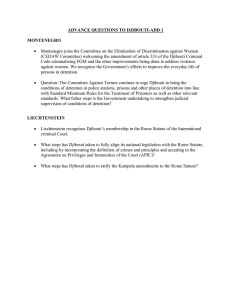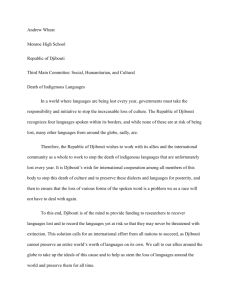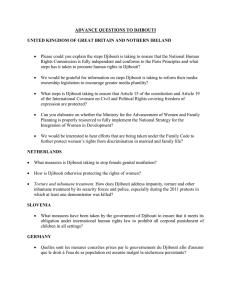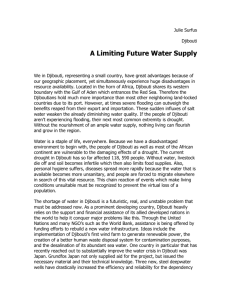Study on the situation of ... children and adolescents, as well as women and girls.
advertisement
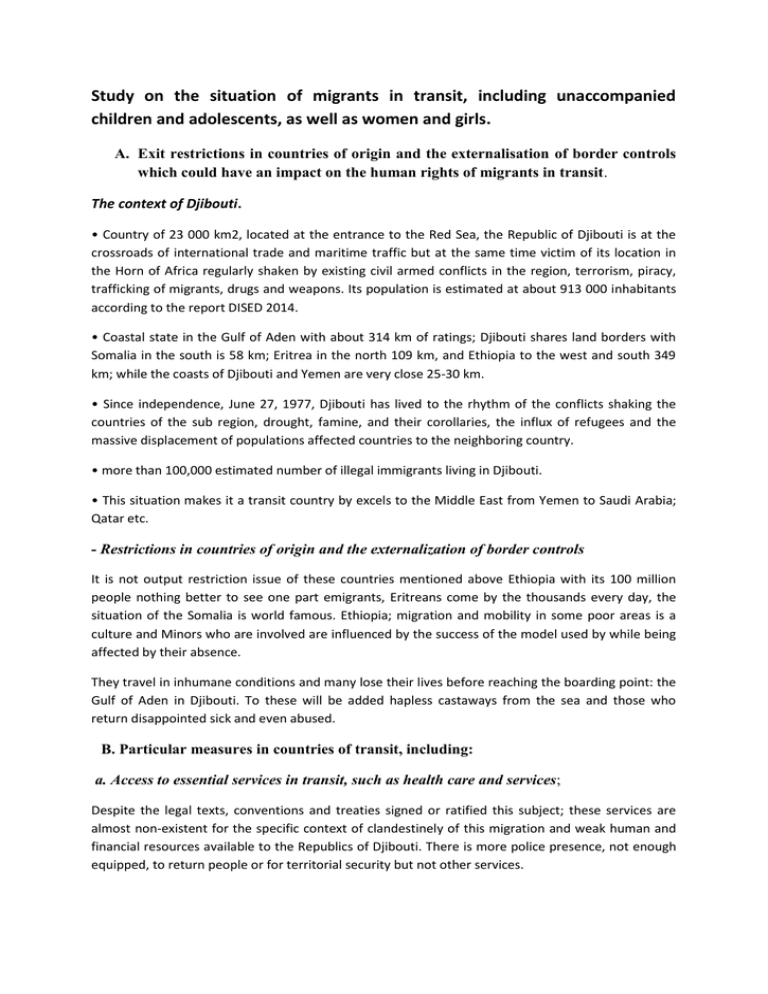
Study on the situation of migrants in transit, including unaccompanied children and adolescents, as well as women and girls. A. Exit restrictions in countries of origin and the externalisation of border controls which could have an impact on the human rights of migrants in transit. The context of Djibouti. • Country of 23 000 km2, located at the entrance to the Red Sea, the Republic of Djibouti is at the crossroads of international trade and maritime traffic but at the same time victim of its location in the Horn of Africa regularly shaken by existing civil armed conflicts in the region, terrorism, piracy, trafficking of migrants, drugs and weapons. Its population is estimated at about 913 000 inhabitants according to the report DISED 2014. • Coastal state in the Gulf of Aden with about 314 km of ratings; Djibouti shares land borders with Somalia in the south is 58 km; Eritrea in the north 109 km, and Ethiopia to the west and south 349 km; while the coasts of Djibouti and Yemen are very close 25-30 km. • Since independence, June 27, 1977, Djibouti has lived to the rhythm of the conflicts shaking the countries of the sub region, drought, famine, and their corollaries, the influx of refugees and the massive displacement of populations affected countries to the neighboring country. • more than 100,000 estimated number of illegal immigrants living in Djibouti. • This situation makes it a transit country by excels to the Middle East from Yemen to Saudi Arabia; Qatar etc. - Restrictions in countries of origin and the externalization of border controls It is not output restriction issue of these countries mentioned above Ethiopia with its 100 million people nothing better to see one part emigrants, Eritreans come by the thousands every day, the situation of the Somalia is world famous. Ethiopia; migration and mobility in some poor areas is a culture and Minors who are involved are influenced by the success of the model used by while being affected by their absence. They travel in inhumane conditions and many lose their lives before reaching the boarding point: the Gulf of Aden in Djibouti. To these will be added hapless castaways from the sea and those who return disappointed sick and even abused. B. Particular measures in countries of transit, including: a. Access to essential services in transit, such as health care and services; Despite the legal texts, conventions and treaties signed or ratified this subject; these services are almost non-existent for the specific context of clandestinely of this migration and weak human and financial resources available to the Republics of Djibouti. There is more police presence, not enough equipped, to return people or for territorial security but not other services. Unaccompanied children (PII), there is a minimum service of IOM in collaboration with public services in reception centers especially for a voluntary return, the Djibouti government has established a recycling center OBOCK which are transmitted to all children arrested and handed over to IOM which handles arrange for repatriation in collaboration with IOM Ethiopia and some returning to their country for themselves. In this sensitive area collaborate ONARS, IOM, UNHCR, UNICEF to tackle this scourge and recycling facilities operating at full capacity. In rural areas, there is a specific reception center for children, and unaccompanied children are used to foster families by age group, language, or ethnic group, as long as the procedure repatriation has not yet been completed. At the UNHCR / UNHCR the flow of migrants mingles with that of refugees while crossing migrants to refugee status is open according the requirements. b. Protection from violence, including sexual and gender-based violence, as well as abuse and exploitation of migrants in transit by State and non-State actors; Legal provisions exist but the clandestine nature of that migration favors the non-implementation of these provisions, and open to abuse whose exploitation, exclusion; refoulement or other abuses ... The Children migrant alone (EIM) suffer from these ills in Djibouti. c. Specific measures to protect and ensure the best interests of all migrant children in transit, whether they are travelling on their own or with their parents/guardians; International instruments of protection of fundamental rights and freedoms have been signed and ratified by Djibouti; including the Convention on the Rights of the Child and the two Optional Protocols and the African Charter on the Rights and Welfare of the child, etc. Besides these there are other provisions in the regional context. Children of the streets or without fixed domiciles welcomed and followed by Caritas Djibouti are in cases and do not enjoy any rights, failing which papers primarily '' birth 'and undergo regular backups. d. Rescue of migrants in distress at land, sea and air borders, provision of immediate assistance and referral to adequate services; The Republic of Djibouti has no ability and means necessary for this. It is limited to border control and custody of the coasts as public services, police routinely collect these corpses or some victims of drought, fatigue or shipwrecks makeshift émbarquassions between Djibouti and Yemen. Occasionally, they intercept boats traffickers. e. Alternatives to immigration detention and protection against arbitrary detention; Faced with this situation, quick and easy alternative is the rejection at the border, although the immigration detention is not common in Djibouti. The majority of remaining illegal migrants as indicated above. Conventional alternatives to detention for immigration are not much used. f. Measures to ensure that any returns of migrants in transit are carried out in accordance with international law and standards, including the principle of non-refoulement and the prohibition of collective expulsion. The presence of IOM in charge of the return of migrant volunteers can implement existing international measures in this regard when cases arise. At the governmental level is more repression, marginalization or mass expulsion, which is the case for the children of the mentioned high streets. C. The availability and adequacy of a human rights-based approach to transit migration, including: a. Governance of irregular migration, including avoiding the criminalisation of migrants in an irregular situation; This availability is in Djibouti through international, regional and national legal instruments that the Republic of Djibouti has acquired or has signed and ratified. The question is enforcement. b. Measures to prevent and combat all forms of xenophobia, racism and religious intolerance against migrants; Despite problems are resulting from this continuous flow of migrants in transit, the Government of Djibouti and even the population remain welcoming and tolerant, Djibouti is a haven, also in case of need, these measures result from all the provisions outlined above. c. Human rights-based approaches to border governance, including in the context of counter-smuggling measures; In international conventions, Djibouti has agreements with supplier countries of migrants (Ethiopia, Somalia ...), the Interministerial Commission for the application exist. d. Data collection measures to monitor the situation of migrants in transit, including on the number of migrants killed, injured or victims of crime while attempting to cross international borders. The collection of statistical data in this area is not systematic. There are not yet mandatory. The environment described above in context level; requires resources accordingly. Djibouti 30 November 2015 ∞∞∞∞∞∞∞∞∞∞∞∞∞∞∞∞∞∞∞∞∞∞∞∞∞
